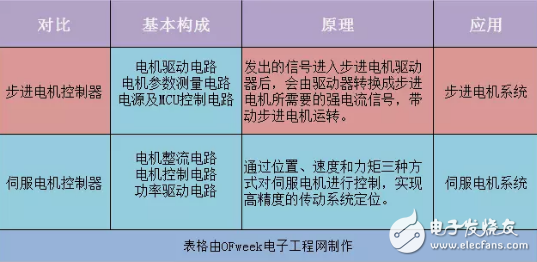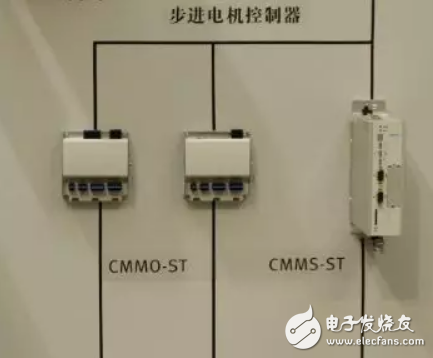
Pernyataan privasi: Privasi anjeun penting pisan pikeun kami. Perusahaan urang jangji henteu ngungkabkeun inpormasi pribadi anjeun kana ijin anu jelas.
+86-0510-86199063
Stepper motors and servo motors are the two most widely used products in the industrial control field, and their cores are stepper motor controllers and servo motor controllers respectively. This article will explain the differences between these two devices.

1. The working principle is different

Stepper motor controller: It is an electronic product that can send out uniform pulse signals. After the signal sent by it enters the stepper motor driver, it will be converted by the driver into the strong current signal required by the stepper motor to drive the stepper motor to run . The stepper motor controller can accurately control the stepper motor to rotate through every angle. What the driver receives is a pulse signal. Each time it receives a pulse, the driver will give the motor a pulse to make the motor rotate a fixed angle. Because of this feature, stepper motors are widely used in various industries today.
Servo motor controller: It is a controller used to control a servo motor. Its function is similar to that of a frequency converter acting on an ordinary AC motor. It is a part of the servo system and is mainly used in high-precision positioning systems. Generally, the servo motor is controlled through three ways of position, speed and torque to achieve high-precision transmission system positioning. It is currently a high-end product of transmission technology.
Two, the composition is different
1. The three major circuits of stepper motor controller
Motor drive circuit: Design a stepping motor drive circuit on the basis of the H-bridge circuit. The use of discrete component MOS transistors to build a dual H-bridge drive circuit is a mature motor control scheme. The circuit is not complicated. According to the different operating currents of the MOS transistors, the upper limit can even be as high as tens of amperes. It is an ideal stepper motor driver scheme.
Motor parameter measurement circuit: Constantan resistor is selected as the current sampling resistor of the motor, one end is connected under the H bridge, and the other end is connected to GND. The voltage and current signal conditioning circuit is built with LM324 operational amplifier. After the voltage is followed, it is sent to the MCU, and the MCU has a built-in 10Bit A/D converter for A/D sampling. The case temperature monitoring selects the digital temperature chip DS18B20, which is attached to the surface of the motor case, and the temperature parameters are monitored in real time and sent to the MCU.
Power supply and MCU control circuit: The drive circuit in the system is powered by the input voltage, and the MCU and Bluetooth module need an additional 3.3V power supply. The traditional linear regulator has low efficiency, large size and serious heat generation, so DC-DC switching power supply is used The method provides 3.3V voltage to ensure the normal operation of the device.
2. The circuit composition of the servo motor controller
Motor rectifier circuit: The main topology circuit of the rectifier unit is a three-phase full-bridge uncontrolled rectifier circuit, which is essentially a series of three-phase half-wave controllable rectifier circuits with a common cathode and a common anode. It is customary to connect the cathodes together. The three thyristors whose anodes are connected are called a common cathode group; the three thyristors whose anodes are connected together are called a common anode group.
Power drive circuit: The power drive unit generally uses an intelligent power module to rectify the input three-phase power or mains power through a three-phase full-bridge rectifier circuit to obtain the corresponding direct current. The power unit is a high-voltage inverter component that uses power electronic devices for rectification, filtering, and inversion. It is mainly composed of rectifier bridges, thyristors, electrolytic capacitors, and IGBTs. The entire process of the power drive unit can be simply said to be an AC-DC-AC process.
Motor control circuit: The main circuit uses a digital signal processor as the control core, which can realize more complex control algorithms and perform intelligent control.
Three, each application field has its own characteristics
Servo drives are widely used in the field of injection molding machines, textile machinery, packaging machinery, CNC machine tools, etc. Stepper motors are mainly used in some occasions with positioning requirements, such as wire cutting table dragging, tufting machine table, packaging machine. It can also be used in ATM machines, inkjet printers, plotters, photo machines, spraying equipment, medical instruments and equipment, computer peripherals and mass storage equipment, precision instruments, industrial control systems, office automation, robotics and other fields.
Regardless of whether it is a stepper motor controller or a servo motor controller, their characteristics determine the application, and they have their own space in the industrial control field. In the future, with the advancement of "Industry 4.0", the application prospects are unlimited.
April 24, 2024
October 23, 2023
August 16, 2023
Email pikeun supplier ieu
April 24, 2024
October 23, 2023
August 16, 2023

Pernyataan privasi: Privasi anjeun penting pisan pikeun kami. Perusahaan urang jangji henteu ngungkabkeun inpormasi pribadi anjeun kana ijin anu jelas.

Eusian langkung seueur inpormasi supados tiasa nyambung sareng anjeun gancang
Pernyataan privasi: Privasi anjeun penting pisan pikeun kami. Perusahaan urang jangji henteu ngungkabkeun inpormasi pribadi anjeun kana ijin anu jelas.